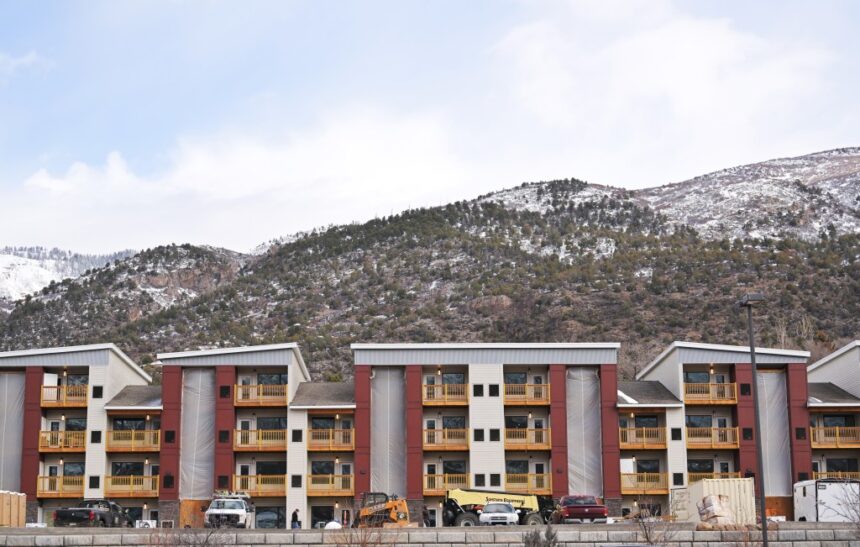Patricia Dore had multiple concerns on her mind when she pored over her lengthy Denver ballot for the Nov. 5 election. Public safety was high on the list, and fiscal responsibility factored into her decision-making, too.
But housing also shaped her thinking — even though she’s an 81-year-old retiree who has lived in the same southeast Denver home for five decades.
“It just blows my mind, the cost of housing,” Dore said after depositing her ballot in the drop box outside the Cook Park Recreation Center last week. “I have grandkids who are working, and they are concerned. My one grandson said, ‘I’ll never be able to get a house.’ ”
In Denver and Adams County, local leaders have asked voters to approve sales tax increases that would raise significant money for affordable housing work, including new development. But Dore and other voters concerned about the state’s housing shortage, along with high rent and mortgage costs, are finding this year that the issues penetrate beyond those obvious measures on the ballot.
From statehouse campaigns to the presidential race, candidates are talking about policies and strategies to make housing more attainable for low- and moderate-income people. It’s a demonstration of how wide the pain has spread in Colorado and across the nation.
But just how effective that issue will be in swinging votes remains an open question.
Dore would not say how she voted on Denver Ballot Issue 2R, the 0.5% sales tax increase spearheaded by Mayor Mike Johnston that would raise an estimated $100 million per year for housing investments and programs.
But she emphasized that she was looking for candidates who, even if they do not make it a top issue, acknowledge the challenge housing costs pose for residents to make ends meet in the Mile High City.
“It’s important. Are they talking about it?” Dore said.
Voters routinely identify housing costs as a top concern, including in the Voter Voices survey conducted in recent months by The Denver Post and other news outlets across the state; it was a recurring theme in responses about the cost of living.
A recent poll of the tightly contested 8th Congressional District found likely voters in Denver’s north suburbs and the northern Front Range were most concerned about the economy, followed by a virtual tie between housing affordability and immigration. And 89% of Coloradans surveyed by the Colorado Health Foundation in May and June said housing affordability was an extreme or very serious problem.
That concern has sparked sweeping policy proposals. Housing has dominated Colorado’s last two regular legislative sessions, with a slew of reforms passing earlier this year. Candidates — Republican and Democrat, urban and rural — have also talked more openly, and often unprompted, about the need to address the issue.
Finding common ground
In the traditional Republican stronghold of Colorado Springs, Democratic Rep. Stephanie Vigil is seeking reelection to her State House District 16 seat by leading with housing and transportation as her top issues. One of her bills in the 2024 session banned municipalities from setting minimum parking requirements for new developments near transit — a move intended, in part, to drive down construction costs, with the savings potentially passed on to renters or commercial tenants.
“I found myself having some interesting conversations with a couple of community members and constituents and more conservative folks,” she said. “They’re excited (that) they have something they have in common with Democrats.”
Vigil’s Republican opponent, Rebecca Keltie, has emphasized lowering taxes and fees to improve affordability.
In Denver, Republican congressional candidate Valdamar Archuleta made bringing down the cost of living a central plank of his platform in his longshot bid to unseat U.S. Rep. Diana DeGette in Colorado’s 1st Congressional District. He said it was what voters kept talking to him about when he hit the campaign trail earlier this year, and he knows housing costs are the primary driver of Denver’s cost-of-living increase.
In the presidential race, Vice President Kamala Harris came out with a housing plan before she even gave her nomination acceptance speech at the Democratic National Convention in late August.
That plan includes using federal incentives, tax credits and programs to spur the construction of 3 million new housing units across the country. Harris is also proposing supporting qualified first-time homebuyers with $25,000 in federal down payment assistance. Her campaign projects that program would support 4 million households over four years.
Former President Donald Trump, again the Republican nominee, has talked about housing on the campaign trail, though he has offered few specifics on how he would address the problem in a would-be second term.
Trump has repeatedly blamed the housing crisis on migrants while hammering on his campaign’s central theme of curtailing immigration and deporting potentially millions of undocumented immigrants. Housing industry groups and economists have said such large-scale deportations would cut into the immigrant labor force that is needed to build housing.
For longtime housing advocates and experts in the state, the fact that candidates are even discussing housing policy is notable.
Peter LiFari, the executive director of the Adams County housing authority, called Maiker Housing Partners, said he learned early in his career that “if you’re an elected official and you’re a proponent of affordable housing, you (won’t be) an elected official for very long.”
Housing shortage has raised issue’s profile
LiFari and others said the pandemic helped change that by spreading eviction and housing insecurity pressures to a broader swath of the American public.
So, too, did trends that predated COVID-19: Housing, in the wake of the Great Recession, had already become increasingly unaffordable and unavailable as new home development lagged behind the demands of a growing Colorado. The result now is higher prices, record evictions and a stretched dynamic in which half of Colorado renters say they spend at least 30% of their income on rent.
Robin Kniech, a former Denver city councilwoman who has worked extensively on housing policy, said the issue became more prominent in politics as those pressures began to build.
When she talked about affordable housing during her first campaign in 2011, she recalled, it stuck with voters who had compassion for people who were poor or experiencing homeless. By the time Kniech ran again 2015, the issue had come home for more voters, many of whom worried about their children’s ability to afford to live in Denver, she said.
Alex Goldstein, 28, a Denver voter, said she was more than happy to support the Ballot Issue 2R tax as she dropped her ballot in the box at the Cook Park rec center on Wednesday.
Both she and her husband are lawyers. She practices family law and he is a public defender. But the couple needed family help to buy their first home earlier this year, Goldstein said. Her husband’s grandmother moved into assisted living, she said, giving them the opportunity to buy her house at a more affordable price.
“We were really lucky to do that. We were renters before that and were always worried about the next rent increase,” Goldstein said. “Any way we can make housing more affordable for everyone in Denver — not just those who are more fortunate — is really important.”
Though legislators and political candidates are increasingly tackling housing policy, the issue does not fit neatly within ideological boundaries, and policy solutions can differ dramatically within one party’s ranks.
While Montana Republicans passed sweeping land-use reforms last year, Colorado Republicans have almost uniformly opposed such efforts here. And progressive Democrats in the state have embraced more immediate interventions to blunt evictions and rent increases, but Gov. Jared Polis has instead backed zoning reforms to kickstart development.
“The lack of true ideological centers within the parties make this really difficult because, no matter what solutions you are proposing, you are going to upset people within your coalition,” said Matt McGovern, a veteran Democratic campaign consultant. “And that makes it very tough for it to be the … unifying issue that is popular to both your base and the swing voters that remain.”
Paul Teske, a professor who’s dean of the University of Colorado Denver’s School of Public Affairs, isn’t convinced housing will be effective as a differentiator in the presidential election. Most voters, he suggested, see the housing market as a private-sector issue driven by the forces of supply and demand.
That sentiment echoed Kniech’s belief that “people are skeptical about our ability to solve housing.”
“At one level,” Teske said, “I don’t think it’s going to change the results in many elections as a policy issue. It’s obviously an important issue out there — but so is the broader economy.”
Megan Verlee of Colorado Public Radio contributed to this story.
Stay up-to-date with Colorado Politics by signing up for our weekly newsletter, The Spot.
Originally Published:










